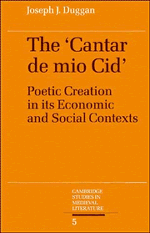Book contents
- Frontmatter
- Dedication
- Contents
- Acknowledgments
- Modern equivalents to names in the maps
- Maps
- 1 Historical and theoretical framework
- 2 The acquisition of wealth
- 3 Economy and gift-giving
- 4 Social status, legitimacy, and inherited worth
- 5 The poet's milieu
- 6 Geography and history
- 7 The Cantar de mio Cid and the French epic tradition
- 8 Mode of composition
- 9 Conclusion
- Notes
- List of references
- Index
7 - The Cantar de mio Cid and the French epic tradition
Published online by Cambridge University Press: 05 August 2014
- Frontmatter
- Dedication
- Contents
- Acknowledgments
- Modern equivalents to names in the maps
- Maps
- 1 Historical and theoretical framework
- 2 The acquisition of wealth
- 3 Economy and gift-giving
- 4 Social status, legitimacy, and inherited worth
- 5 The poet's milieu
- 6 Geography and history
- 7 The Cantar de mio Cid and the French epic tradition
- 8 Mode of composition
- 9 Conclusion
- Notes
- List of references
- Index
Summary
The poet's place in society must be inferred from details found in the poem itself, since history has provided us with no other access to him. If the Cantar de mio Cid can be shown to owe something to foreign literary models, a strong case might be made that he belonged among the small number of individuals who were literate in this period of Castilian history. Foremost among hypotheses of this type is the idea that he had access to French models, which might imply also that he traveled to France. This issue thus has implications for establishing the poet's social context. It was first raised in the nineteenth century by Andrés Bello and François Génin (for a bibliography of studies see Horrent 1973) and it has come to the fore in recent years in the writings of British Hispanists. Colin Smith has defended the idea that the Cid poet was a learned man – schooled in Latin, able to read French – and that he resided in France for part of his life, and others have supported Smith's hypotheses with further arguments in the same direction. In this chapter I shall review the arguments of those who have perceived French influences in the Cantar de mio Cid, evaluating them and placing them in perspective.
- Type
- Chapter
- Information
- The Cantar de mio CidPoetic Creation in its Economic and Social Contexts, pp. 108 - 123Publisher: Cambridge University PressPrint publication year: 1989



